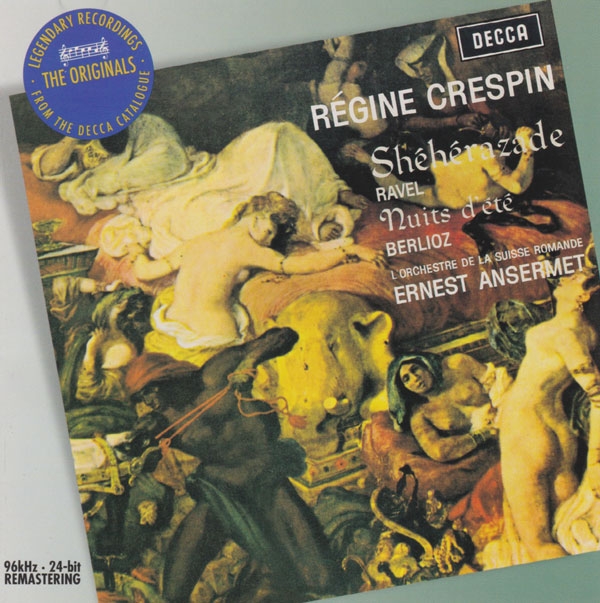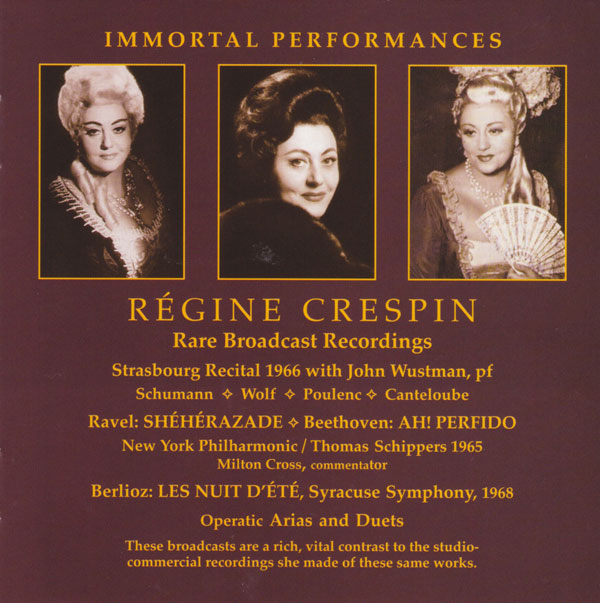| Columns Retired Columns & Blogs |
Looking forward to my copy from Arkiv, ordered it today and it was a bargain. Thanks.

Sonically, performances captured during broadcast or from a prime location in hall rarely equal the quality of those recorded in studio by enlightened sound engineers. In this case, however, no apologies are needed. After mastering engineer Richard Caniell received tapes of the material, he discovered very little restoration work needed to be done before he could release them on his British Columbia-based Immortal Performances label. (Note: Norbeck Peters and Ford is the sole distributor of these recordings.) Save for some tape wow on accompanist John Wustman's piano during an invaluable 1966 Strasbourg recital of Schumann, Wolf, Poulenc, and Canteloube, the sound is perfectly acceptable, and far better than on many of the live Callas performances that lovers of the human voice rightly covet.
Of the two song cycles in which Crespin's incomparably sensual soprano is most prized, Les Nuits d'été was captured by Henry Fogel on October 19, 1968, when he was charged with recording the soprano's performance with the Syracuse Symphony Orchestra, which was conducted by Karl Kritz. Clearly Fogel's miking was ideal, because we can hear much of the same air and space that distinguish the Swiss recording of five years earlier. While the orchestra sounds nowhere near as colorful and detailed as Ansermet's, nothing about its sound gets in the way of savoring Crespin's contributions to the fullest.
Fogel reports that Crespin told him, both immediately following the performance and later on, after she heard the tape, that she much preferred Kritz's faster tempi in Syracuse. She felt that Ansermet had dragged the tempi too much, and that Kritz's accompaniment was more appropriate to the ways she heard and felt the music. Despite the fact the Kritz got through the cycle three minutes faster than Ansermet, she experienced more freedom to phrase the music according to the dictates of her heart. From my vantage point, as someone who thinks that Berlioz often goes on far too long, Kritz's tempos are a blessing.

Both Shéhérazade and an extremely energetic performance of Beethoven's taxing "Ah! Perfido" stem from a 1965 New York Philharmonic performance conducted by Thomas Schippers. For both, you also get introductions and commentary from Milton Cross, who for decades was known as the "voice" of the Metropolitan Opera Texaco radio broadcasts. Cross's knowledge of French pronunciation, New York style, puts to shame the announcer for the Strasbourg relay, who didn't even bother to learn how to pronounce the soprano's surname. The Ravel is especially magical thanks to Crespin's feather-light soft singing, which was all the more miraculous considering that she possessed a Wagnerian sized voice that could soar above a huge orchestra.
I know of no other soprano who sounds like Crespin. In the Strasbourg recital, the core of her voice is so relaxed and languorous that I keep imagining a cross between Cleopatra on her barge, bearing her breast as scantily clad servants dutifully drop carefully peeled grapes into her mouth and brush her skin with ostrich feathers, and images of the voluptuous mezzo Olga Borodina's Delilah seducing her hapless Samson. How Crespin can sound so relaxed and placid one minute, and then sing full out the next, is the mark of a rare artist. Her approach is as ideal for Poulenc's "Hôtel," which ends with the line (in translation), "I don't want to work, I want to smoke," as for Schumann's exquisitely poised, floating "Mondnacht" (Moonlight). I expect you'll love what she does with these songs.
If you also like to compare performances as much as I, you'll be happy to learn that two of the four Wolf songs, all four of the Poulenc gems, and all of Schumann's Op.39 Liederkreis that she sang in Strasbourg were also recorded commercially. What you won't find on any commercial disc, however, are two of the three songs from Canteloube's Chants d'Auvergne—her accent and verve are delicious—and two of the Wolf songs that she performed with frequent accompanist Wustman in Strasbourg. Which alone makes this recital invaluable.
But there's more: three excerpts from Mozart's Così fan tutte, the great aria "Dove sono" from Mozart's Le Nozze di Figaro, and other arias from Pizzetti's Fedra (bet you never heard of that once), Gluck's Iphigénie en Tauride, and, from 1955, when Crespin was 28, the love duet from Verdi's Otello. While some aspects of these performances are better than others, their historical value is immense. Put them together with everything else on the disc, and you've got a pretty complete portrait of a treasured artist in her prime.

Looking forward to my copy from Arkiv, ordered it today and it was a bargain. Thanks.

A great bargain at $11.99 + shipping. A great recording and glad I found it. 1963, 1967, and 2006 reissues.

ArkivMusic does not carry this recording; only Norbeck Peters & Ford and the Immortal Performances website do. ArkivMusic only carries Crespin's commercial recordings.

Terrific review, Jason! Regine Crespin's previous recordings of the Berlioz "Les Nuits d'été" and the Ravel "Shéhérazade" are among my top two or three vocal favorites of all time. I agree completely about the amazing, effortless quality of her voice in its prime, from her huge, penetrating fortissimos to (especially) the gossamer-light pianissimos that she could float into the air like a kiss. I've often wondered why she doesn't show up more prominently in the "greatest sopranos of all time" lists I run into now and again on the internet. I think she deserves more recognition than she has received.